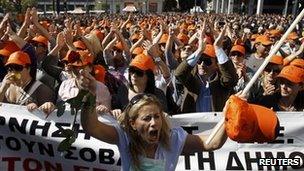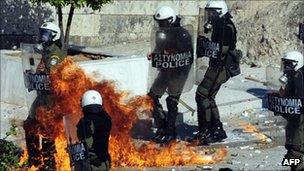Athens erupts over austerity cuts
- Published
- comments

Athens is now seeing great rivers of protesters, and the mood is hardening
Athens was expecting violence. The expectation of it hung in the air. It is all people have spoken of in recent days.
Even tourist hotels some distance from the parliament, external were boarding up. As a 48-hour general strike took hold shopkeepers were hammering in place steel shutters.
The fear that emerged in hushed conversations was that there could be serious casualties. Such is the rage, the frustration that has built over months.
Some shops tried to open for a few hours but certainly in the centre of the city most had closed by 11:00.
I joined some students heading for the parliament. They are outraged that schools have a shortage of books.
One young man said to me that he was not prepared to see decades of social progress sacrificed to satisfy the European Union, external and the IMF, external. Some waved banners with Che Guevara's picture.
Then the column stopped, and from the left marched builders, arms linked, carrying poles with red flags on top. They walked with purpose. They have seen the construction industry collapse.
Then metal workers and teachers. It seemed at times as if the whole city was on the move. In front of the parliament a new police chief had ordered the riot police pull back, and for a while the mood was calm.
Huge crowds

Marches and skirmishes soon became running battles across the capital
But the numbers kept coming; great rivers of protesters.
Certainly I have never seen here in Athens such crowds in the streets. The electricity workers were still trying to reach Parliament Square - four hours after the protests started.
One lawyer told me that she was not prepared to accept it any more. She had friends whose salaries have been cut by 35%.
And with the marchers came young men and women in black hoods and masks. They began tearing at a wire fence that the police had slung across the road at the side of the parliament.
When eventually the police lost patience and fired the first tear gas grenade, the sound echoed across Syntagma Square and the crowd cheered.
There is a sense here that this is the key battle if spending cuts and wage increases are to be defeated.
Then skirmishes became running battles. Some of the anarchists had petrol bombs that snaked through the air falling around the riot police.
They replied with volleys of tear gas and stun grenades. But the numbers involved in the fighting was greater than before.
In the front of the parliament the police had withdrawn to the steps. The crowd pushed forward to the spot where the honour guard usually high steps. One of their guard posts was set alight.
'Greek tragedy'
At stake here is not just whether the Greek parliament can get its legislation through.
Later on Wednesday and on Thursday it will be voting on key austerity measures agreed with the EU and the IMF.
Europe's leaders had insisted that in exchange for bailing Greece out, it had to slash its deficit. The Greek foreign minister told me on Tuesday that no European country had ever tried such cuts in such a short space of time.
But seeing the vast numbers on the street, the government ministries occupied, the violence, it has to be asked whether Greece can impose these new austerity measures.
And if it can't, will the EU and IMF go ahead with the next tranche of bailout money. The so-called troika (the EU, IMF, the ECB, external) is delivering its report this week. Without the next 8bn euros ($11bn; £7bn) Greece will be unable to pay its bills within weeks.
But the mood has hardened here. There is less fear of default.
The finance minister said on Wednesday that "what the country is going through is really tragic".
We are not there yet but the question may have to be faced: what happens if a eurozone country essentially refuses to take the medicine?